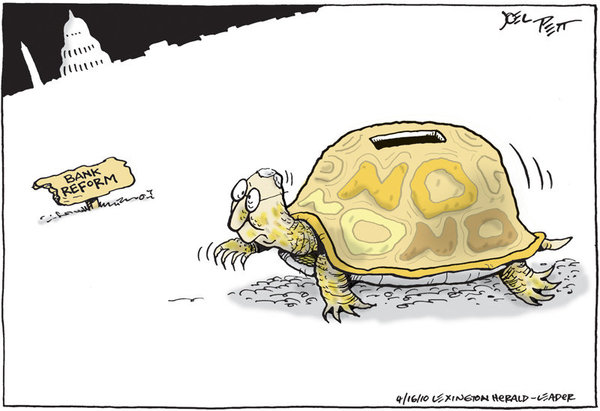A financial professional works in the Goldman Sachs booth on the floor of the New York Stock Exchange while a television reports airs about the company’s lowered stock price April 16.
STORY HIGHLIGHTS
* Prime Minister Gordon Brown attacked the “moral bankruptcy” of Goldman Sachs
* Comes after the US Securities and Exchange Commission accused the bank of fraud
* Goldman: Case has “fatal deficiencies” and no basis “in law … or common sense”
Minister Gordon Brown attacked the “moral bankruptcy” of Goldman Sachs after the US Securities and Exchange Commission accused the world’s most famous bank of fraud.
During his election campaign, he demanded that the Financial Services Authority also probe the allegations. “The banks are still an issue. They are a risk to the economy,” the prime minister said.
Mr Brown’s comments came as it emerged that Goldman and the SEC had not discussed a settlement prior to the announcement of charges last week, and as documents emerged revealing the strained relationship between the bank and the regulator during the 20-month probe.
In a submission to the SEC in September 2009, Goldman said the regulator’s case had “fatal deficiencies” and no basis “in law…or common sense”.
The SEC declined to comment on Sunday.
Politicians on both sides of the Atlantic have been attacking Goldman as they press ahead with tougher global financial regulation.
The German government said it would consider legal steps against Goldman. IKB, a German bank that was one of the first casualties of the global crisis in 2007, was one of three investors in the collateralised debt obligation at the centre of the case and lost about $150m when it collapsed as the US housing bubble burst.
The SEC filed civil charges against Goldman and one of its vice-presidents on Friday, accusing them of failing to disclose that in 2007 Paulson & Co, a hedge fund, had a major role in structuring a mortgage-backed CDO so it could bet against it.
Goldman has denied the charges and vowed to defend itself “vigorously”.
Goldman executives said the position of Lloyd Blankfein, chief executive, was not threatened. But its shareholders will be closely watching how the shares perform on Monday after they fell more than 12 per cent on Friday. Goldman’s first-quarter results are out on Tuesday.
SEC officials said Goldman was fully aware of progress in the probe. People close to the situation said Goldman received notice of the SEC’s intention to press charges in July.
In February, the Financial Times revealed the SEC last year sent subpoenas to banks including Bank of America Merrill Lynch, Barclays, Citigroup, Credit Suisse, Deutsche Bank, Goldman, Morgan Stanley and UBS, seeking information about marketing of CDOs.
British premier Gordon Brown attacked the “moral bankruptcy” of Goldman Sachs after the US Securities and Exchange Commission accused the world’s most famous bank of fraud.
Campaigning for re-election, he demanded that the UK’s Financial Services Authority should also investigate the allegations. “The banks are still an issue. They are a risk to the economy,” he said.
It also emerged that the bank and the US regulator did not discuss a settlement, despite Goldman receiving a Wells notice — a formal notification of the SEC’s intention to press charges — nine months ago. This underlines the hard line taken by both sides in the case.
Politicians on both sides of the Atlantic have been attacking Goldman as they press ahead with tougher global financial regulation.
The German government said it would consider legal steps against Goldman. IKB, a German bank that was one of the first casualties of the global crisis in 2007, was one of three investors in the collaterised debt obligation at the centre of the case and lost about $150m when it collapsed as the US housing bubble burst.
The SEC filed civil charges against Goldman and one of its vice-presidents on Friday, accusing them of failing to disclose that in 2007 Paulson & Co, a hedge fund, had a major role in structuring a mortgage-backed CDO so it could bet against it.
Goldman has denied the charges and vowed to defend itself “vigorously”.
Despite the political furore following the SEC’s charges, Goldman executives said the position of Lloyd Blankfein, chief executive, was not threatened.
But its shareholders will be closely watching how the shares perform today after they fell more than 12 per cent on Friday. Goldman’s first-quarter results are out tomorrow.
The bank’s executives said they were “stunned” by the SEC decision to file charges against the bank and Fabrice Tourre, a 31-year-old vice-president.
The SEC declined to comment but officials said Goldman was fully aware of the progress in the commission’s probe.
People close to the situation said Goldman received the Wells notice in July. Goldman did not disclose this to investors — allowable if the information is not deemed price sensitive.
The SEC often settles cases to avoid lengthy court battles.
In February, the Financial Times revealed that the SEC last year had sent subpoenas to banks including Bank of America Merrill Lynch, Barclays, Citigroup, Credit Suisse, Deutsche Bank, Goldman, Morgan Stanley and UBS, seeking information about the marketing of CDOs
